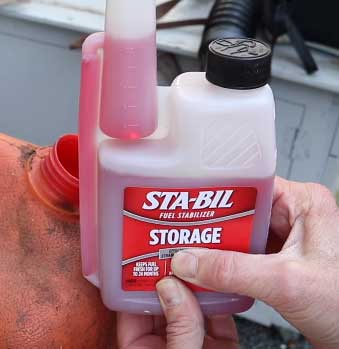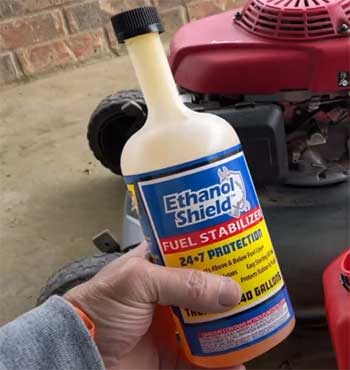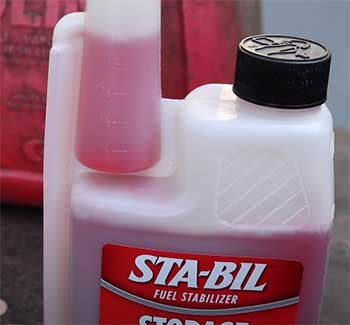As a car owner, you want to protect your engine and fuel system from performance problems and corrosion. Fuel stabilizers like STA-BIL and Ethanol Shield claim to do just that by preventing fuel breakdown and stabilizing fuel chemistry.
But with so many options on the market, how do you choose the right fuel stabilizer?
In this comprehensive guide, we’ll compare STA-BIL and Ethanol Shield head-to-head, looking at:
- Key features of each fuel stabilizer
- Pros and cons of STA-BIL and Ethanol Shield
- Effectiveness in preventing ethanol fuel issues
- Additive formulations and how they work
- Cost and value
- Ease of use
- Independent product reviews
- FAQ on fuel stabilizers
By the end, you’ll have the knowledge to decide which fuel stabilizer is the best choice for your vehicle. Let’s dive in!
A Brief Comparison Table
| Aspects | STA-BIL | Ethanol Shield |
| Purpose | General fuel stabilization | Specialized ethanol protection |
| Fuel Stability | 12 months | Up to 2 years |
| Form | Liquid | Pill |
| Use Frequency | Every tank fill | Every 4,000 miles |
| Cost Per Gallon | $0.13-0.19 | $0.31-0.47 |
| Ethanol Blends | All blends including E85 | All blends including E85 |
| Additives | Proprietary package | Proprietary package |
| Reviews | 4.7/5 stars on Amazon | 4.5/5 stars on Amazon |
| Best For | Value, general stabilization | Severe ethanol issues |
Overview of STA-BIL and Ethanol Shield
STA-BIL and Ethanol Shield are both fuel stabilizers designed to be added to the gas tank to preserve fuel quality and prevent performance issues.
Key features:

STA-BIL:
- Prevents ethanol fuel phase separation
- Stabilizes fuel chemistry for 12 months
- Protects against corrosion
- Improves engine performance
- Works in all gasolines including E10, E15, and E85
Ethanol Shield:
- Protects against phase separation and corrosion from ethanol
- Stabilizes fuel for up to 2 years
- Proprietary formula with advanced additives
- Prevents water absorption
- Works in all ethanol-blended gas
While both products aim to solve similar fuel stability problems, they use different formulations and additives to achieve these goals.
Comparing the Pros and Cons of STA-BIL And Ethanol Shield
To pick the superior fuel stabilizer for your needs, we need to dive deeper into the pros and cons of STA-BIL and Ethanol Shield.
STA-BIL Pros:
- Time-tested formula proven effective for over 60 years
- Recommended by major automotive and marine manufacturers
- Low cost for a full treatment
- Won’t void car manufacturer warranties
- Liquid form for easy pouring into gas tank
- Can be used at every fill up
STA-BIL Cons:
- Only stabilizes fuel for 12 months
- Requires using at each tank fill for best results
- Not specialized for high ethanol content fuels

Ethanol Shield Pros:
- Longer 2-year fuel stabilization
- Advanced formula specifically tackles ethanol issues
- Proprietary additives for superior corrosion prevention
- Positive reviews for solving ethanol problems
- Convenient pill form
Ethanol Shield Cons:
- More expensive per full treatment
- Less frequent use (every 4,000 miles)
- Newer product without long track record
- Mainly targeted at high ethanol gas
As you can see, there are good reasons to choose either fuel stabilizer.
STA-BIL is affordably priced and can be used frequently, while Ethanol Shield offers advanced protection against ethanol at a higher cost.
Also Read: Differences Between Yamaha And STA-BIL Fuel Stabilizers.
Effectiveness Against Ethanol
Ethanol in fuel can cause a number of problems including corrosion, phase separation, and performance issues. So how well do STA-BIL and Ethanol Shield handle ethanol?
STA-BIL uses a combination of hydrocarbon stabilizers, corrosion inhibitors, and a proprietary additive package to maintain fuel stability. It prevents phase separation for all ethanol blends and stops corrosion in engines from E10 to E85.
However, some users report STA-BIL being less effective in very high ethanol concentrations like E85.
Meanwhile, Ethanol Shield is purpose-built to tackle high ethanol fuels. The formula contains strong water absorbing agents to prevent phase separation. It also has potent corrosion inhibitors that form a protective barrier inside the fuel system.
Most users found Ethanol Shield prevented ethanol-related problems, even with sensitive marine engines running E10 gasoline.
The verdict: For high ethanol fuels, Ethanol Shield seems to have an edge over STA-BIL based on user experiences. But both offer solid protection against lower ethanol blends like E10 and E15.
How Fuel Stabilizers Work?
To understand why STA-BIL and Ethanol Shield protect your engine, we need to look at how they work on a chemical level.
All gasoline contains many different hydrocarbon compounds like alkenes, arenes, and alkanes. Over time, reactions between these compounds can form gums, varnishes, and deposits that clog fuel systems.
Both STA-BIL and Ethanol Shield contain detergent and dispersant additives that prevent deposit buildup by suspending contaminants.
Ethanol is hygroscopic, meaning it absorbs water from the air. Phase separation happens when the ethanol and water separate from the gasoline into a corrosive layer.
Fuel stabilizers use chemistry like glycol ethers to act as water scavengers and keep ethanol blended with the fuel.
Finally, corrosion inhibitors interact with metal surfaces to form protective barrier layers. STA-BIL and Ethanol Shield have their own proprietary corrosion inhibitors to reduce rust and oxidation inside tanks and fuel lines.
So in summary, the right additive package can stabilize fuel chemistry, remove deposits, control water, and prevent corrosion. Both STA-BIL and Ethanol Shield leverage this chemistry, but with differing formulations.
Also Read: Comparison of Techron Fuel System Cleaner And Injector Cleaners.
Cost Comparison of STA-BIL and Ethanol Shield
When evaluating fuel stabilizers, the cost is an important factor to weigh. Let’s break down the pricing:
STA-BIL
- 32 oz bottle: $10-15
- Treats 80 gallons of gas
- Per gallon cost: $0.13-0.19
Ethanol Shield
- 8 pills: $10-15
- Treats 32 gallons of gas
- Per gallon cost: $0.31-0.47
For a full tank treatment, Ethanol Shield is about 2-3 times more expensive than STA-BIL per gallon. However, since Ethanol Shield is used less frequently, the yearly cost may end up being comparable.
Ultimately, Ethanol Shield offers specialized protection that may justify the higher price. But STA-BIL is the most economical option for treating gas at every fill up.
Ease of Use
Both fuel stabilizers aim to be convenient and easy to use:
- STA-BIL comes premixed as a liquid, so you simply pour the correct amount into your gas tank when filling up. The downside is having to remember to add it each time.
- Ethanol Shield comes in individually wrapped pills. Just toss one pill in per 8 gallons of gas. The pills are grab-and-go easy, but you have to wait longer between treatments.
For the most hassle-free experience, Ethanol Shield may have a slight advantage. The pills remove the guesswork of how much to use or how often to treat your gas.
Independent Product Reviews
Looking at independent product reviews is always wise when comparing options. Here’s what users and experts are saying:
STA-BIL

- Highly rated 4.7/5 stars across 29,000+ reviews on Amazon
- Many positive reviews praise it for stabilizing ethanol fuels and fixing performance problems
- Reviews mention it protects engines and prevents issues from stale gas
- Boating sites consistently recommend STA-BIL for marine engines
Ethanol Shield
- Rated 4.5/5 stars over 500+ reviews on Amazon
- Numerous reviews mention it solved ethanol corrosion and phase separation issues
- Many positive reviews from boat owners with ethanol fuel problems
- Some expert sites label it the best fuel stabilizer specifically for high ethanol gas
Both STA-BIL and Ethanol Shield enjoy glowing reviews and recommendations from users.
STA-BIL benefits from its long-standing reputation, while Ethanol Shield earns praise as a specialty ethanol additive.
Also Read: Comparison of Techron High Mileage And Complete Fuel System Cleaners.
FAQ on Fuel Stabilizers (FAQ)
Yes, STA-BIL contains corrosion inhibitors and additives that help prevent phase separation, corrosion, deposits, and other issues caused by ethanol in gas. It is effective at stabilizing ethanol blends up to E85.
For general fuel stabilization, STA-BIL is one of the top-rated options due to its affordable price and proven performance protecting gas for 12 months. For specialized ethanol protection, Ethanol Shield is one of the best options thanks to its advanced formula combating ethanol problems.
Ethanol Shield is likely the best fuel stabilizer specifically for high ethanol fuels like E85. Its potent corrosion inhibitors and water absorbing agents target the stability problems caused by ethanol.
Yes, STA-BIL is still beneficial for non-ethanol gas (E0). All gasoline deteriorates over time, leading to oxidation and deposit formation. Using STA-BIL periodically helps keep E0 gas fresh and stable for optimal performance.
The Verdict
After comparing STA-BIL and Ethanol Shield head-to-head, both have compelling advantages as fuel stabilizers:
STA-BIL is the value choice, offering complete fuel stabilization at a low cost. With over 60 years of proven results, it’s hard to beat for the price.
Ethanol Shield specializes in fighting ethanol issues. For boaters and drivers using high ethanol gas, its advanced formula offers superior corrosion protection.
Ultimately, choose STA-BIL if you want an affordable stabilizer to use at every fill-up. It keeps fuel fresh for 12 months and prevents problems from lower ethanol blends.
Choose Ethanol Shield if you need maximum protection against phase separation and corrosion caused by high ethanol gasoline. It’s a specialty product designed to tackle ethanol challenges.
No matter which you choose, using a quality fuel stabilizer should be part of every vehicle owner’s maintenance routine. Keeping your gas stable improves performance, prevents repairs, and protects your investment.

